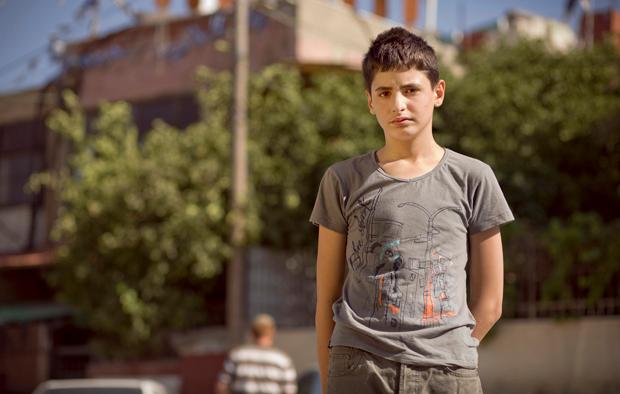New documentary goes inside Jewish-Palestinian relations in Jerusalem
Mohammed El Kurd’s story of eviction by Israeli settlers is told in the documentary “My Neighbourhood.” (Photo by Emily Smith/Just Vision.)
A documentary called “My Neighbourhood” had its West Coast premiere at San Francisco’s historic Castro Theater recently.
Directed by Brazil’s Julia Bacha and Rebekah Winger-Jabi, it begins with a Palestinian teen, Mohammad El Kurd. In the film, he introduces his family and home in the Palestinian neighborhood of East Jerusalem.
“I live in Jerusalem in Sheikh Jarrah neighborhood,” Mohammad said. “This is my father. This is my library. I have lots of books.”
It’s a peaceful introduction. And then Mohammad’s life is upended.
Soon, we hear Mohammad’s grandmother shouting at Israeli settlers in 2009. They’d won the legal right to evict Mohammad’s family and his neighbors from homes they’ve lived in since 1956, part of an ongoing push by Jewish settlers for more control over Palestinian areas.
The film’s distinction is its focus on Mohammad, a bewildered 11-year-old living through it all. It’s a rare perspective on Israeli-Palestinian headlines.
In San Francisco, the film stirred complex feelings for people like Lois Jacobs, a nurse who was in the audience.
“I guess I have been more partial to the Israelis that are doing the occupying,” Jacobs said. “But after seeing this particular film it gives me a very painful feeling because I know that these families are being evicted from their home with all their possessions. And where do they go? What do they do? And it hurts me.”
It’s a response that Just Vision, the filmmaking group behind “My Neighbourhood,” hopes to elicit.
“You hear so often about this conflict but it’s translated into these broad political processes that people can’t really think of in tangible terms,” said Nadav Greenberg, the film’s associate producer. “Seeing someone kicked out of their home in the middle of the day, and then other families moving in in front of their very eyes is something that’s very difficult to remain indifferent to.”
In East Jerusalem, the film’s affected Mohammad, too. He’s 14 now, wants to become a human rights lawyer, and recently went to the documentary’s screening at the European Parliament in Brussels. In a phone interview from Jerusalem, he said it was a surreal, surprising journey.
“It’s my first time out of the Middle East,” he said. “Also, when I went to the European Parliament, I thought it’s going to be really hard because I always think, I don’t know, they’re politicians and what we see in the news — those mad faces and stuff. I just imagined they would all be, like, mad.”
The film does include claims by the Israeli settlers, sentiments held by an increasingly vocal and politically influential minority of Jews. In the film, a leader of the Jewish settlement movement said, “the Bible says that this area and this country belongs to the Jewish people. All this area will be a Jewish neighborhood.”
But the film focuses on the Palestinian experience and that included the shock of seeing Israelis from West Jerusalem also protest the evictions. When Mohammad first saw the protesters, he asked himself, ‘These are Jews?’”
“I was shocked,” he said. “I thought they’re Jews and Jews are bad and stuff. But no, I found out most of the Jews are good.”
Greenberg, the film’s associate producer, who is from Jerusalem, was also there in 2009 and joined other Israelis defending the Palestinians. He says that “My Neighbourhood” highlights a moment of Israeli-Palestinian solidarity, especially now.
“Things like evictions of families in East Jerusalem, things like growing settlements in East Jerusalem are pushing the city to the brink,” Greenberg said. “And if things explode in Jerusalem, things explode around the region.”
Since the evictions, Mohammad’s family, more than 10 relatives in all, have lived in a cramped annex. Bizarrely, it’s in the back of their former home, where settlers now live. Relations are poisoned. Mohammad said that he and his new neighbors never talk.
“Never,” he said. “When people say, ‘How’s your new neighbors?’ Like, they’re not neighbors. You know, when a virus comes to the body, they are just like small cancer and I know someday they will just go away.”
For now, Mohammad says he’s glad that a wider public can see his life and also know the story of the Israelis who came to his family’s side. It gives him strength, he says, when a resolution to his home life now still seems far away.
